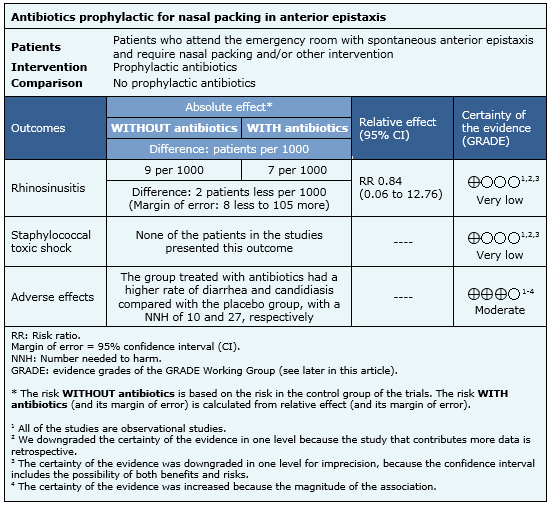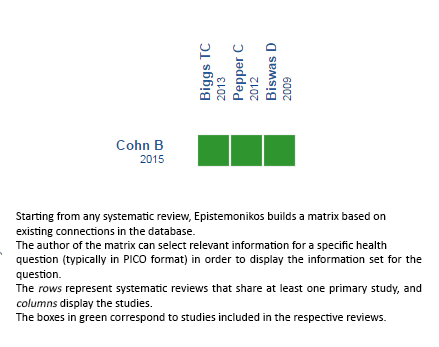 Para Descargar PDF debe Abrir sesión.
Para Descargar PDF debe Abrir sesión.
Epistaxis is an extremely common problem that sometimes requires anterior nasal packing. Antibiotics are frequently indicated to prevent infectious complications, although the role of this measure is controversial. Searching in Epistemonikos database, which is maintained by screening 30 databases, we identified one systematic review including three primary studies, none of them randomized. We combined the evidence using meta-analysis and generated a summary of findings table following the GRADE approach. We concluded it is not clear whether prophylactic antibiotics reduce infectious complications in patients with nasal packing for anterior epistaxis because the certainty of the evidence is very low.
Epistaxis is a common problem that usually resolves spontaneously. However, in some cases it requires hospital care and interventions of different complexity. Among these, one of the most common is anterior nasal packing, after which antibiotics are commonly indicated in order to prevent infectious complications.
We used Epistemonikos database, which is maintained by screening more than 30 databases, to identify systematic reviews and their included primary studies. With this information we generated a structured summary using a pre-established format, which includes key messages, a summary of the body of evidence (presented as an evidence matrix in Epistemonikos), meta-analysis of the total of studies, a summary of findings table following the GRADE approach and a table of other considerations for decision-making.
|
Key messages
|
|
What is the evidence. |
We found only one systematic review [1] including three non-randomized studies, two of them retrospective and one prospective [2],[3],[4]. |
|
What types of patients were included |
All of the studies included patients treated in emergency rooms for spontaneous anterior epistaxis requiring nasal packing and/or other intervention. |
|
What types of interventions were included |
All studies compared use of prophylactic antibiotics against no antibiotics. Amoxicillin-clavulanic acid was used in all of the studies, although others as clarithromycin and piperacillin/tazobactam were also used [3],[4]. |
|
What types of outcomes |
The outcome measured by the studies was "infectious complications". This term refers to bacterial sinusitis, acute otitis media and staphylococcal toxic shock. It was measured through questionnaires and/or laboratory or radiological examinations when needed. |
Information on the effects of antibiotics in patients with nasal packing for epistaxis is based on three non-randomized studies involving 234 patients. All studies measured bacterial rhinosinusitis and staphylococcal toxic shock. The information on the adverse effects comes from a systematic review including 45 randomized controlled studies [5].


|
To whom this evidence does and does not apply |
|
| About the outcomes included in this summary |
|
| Balance between benefits and risks, and certainty of the evidence |
|
| What would patients and their doctors think about this intervention |
|
| Resource considerations |
|
|
Differences between this summary and other sources |
|
| Could this evidence change in the future? |
|
Using automated and collaborative means, we compiled all the relevant evidence for the question of interest and we present it as a matrix of evidence.

Follow the link to access the interactive version: Prophylactic antibiotics for anterior nasal packing in epistaxis
The upper portion of the matrix of evidence will display a warning of “new evidence” if new systematic reviews are published after the publication of this summary. Even though the project considers the periodical update of these summaries, users are invited to comment in Medwave or to contact the authors through email if they find new evidence and the summary should be updated earlier. After creating an account in Epistemonikos, users will be able to save the matrixes and to receive automated notifications any time new evidence potentially relevant for the question appears.
The details about the methods used to produce these summaries are described here http://dx.doi.org/10.5867/medwave.2014.06.5997.
Epistemonikos foundation is a non-for-profit organization aiming to bring information closer to health decision-makers with technology. Its main development is Epistemonikos database (www.epistemonikos.org).
These summaries follow a rigorous process of internal peer review.
Conflicts of interest
The authors do not have relevant interests to declare.
 Esta obra de Medwave está bajo una licencia Creative Commons Atribución-NoComercial 3.0 Unported. Esta licencia permite el uso, distribución y reproducción del artículo en cualquier medio, siempre y cuando se otorgue el crédito correspondiente al autor del artículo y al medio en que se publica, en este caso, Medwave.
Esta obra de Medwave está bajo una licencia Creative Commons Atribución-NoComercial 3.0 Unported. Esta licencia permite el uso, distribución y reproducción del artículo en cualquier medio, siempre y cuando se otorgue el crédito correspondiente al autor del artículo y al medio en que se publica, en este caso, Medwave.

Epistaxis is an extremely common problem that sometimes requires anterior nasal packing. Antibiotics are frequently indicated to prevent infectious complications, although the role of this measure is controversial. Searching in Epistemonikos database, which is maintained by screening 30 databases, we identified one systematic review including three primary studies, none of them randomized. We combined the evidence using meta-analysis and generated a summary of findings table following the GRADE approach. We concluded it is not clear whether prophylactic antibiotics reduce infectious complications in patients with nasal packing for anterior epistaxis because the certainty of the evidence is very low.
 Autores:
Francisco Pérez[1,2], Gabriel Rada[2,3,4,5,6]
Autores:
Francisco Pérez[1,2], Gabriel Rada[2,3,4,5,6]

Citación: Pérez F, Rada G. Is antibiotic prophylaxis in nasal packing for anterior epistaxis needed?. Medwave 2016;16(Suppl 1):e6357 doi: 10.5867/medwave.2015.6357
Fecha de publicación: 7/1/2016

Nos complace que usted tenga interés en comentar uno de nuestros artículos. Su comentario será publicado inmediatamente. No obstante, Medwave se reserva el derecho a eliminarlo posteriormente si la dirección editorial considera que su comentario es: ofensivo en algún sentido, irrelevante, trivial, contiene errores de lenguaje, contiene arengas políticas, obedece a fines comerciales, contiene datos de alguna persona en particular, o sugiere cambios en el manejo de pacientes que no hayan sido publicados previamente en alguna revista con revisión por pares.
Aún no hay comentarios en este artículo.
Para comentar debe iniciar sesión
 Medwave publica las vistas HTML y descargas PDF por artículo, junto con otras métricas de redes sociales.
Medwave publica las vistas HTML y descargas PDF por artículo, junto con otras métricas de redes sociales.
 Cohn B. Are prophylactic antibiotics necessary for anterior nasal packing in epistaxis? Ann Emerg Med. 2015 Jan;65(1):109-11. | CrossRef | PubMed |
Cohn B. Are prophylactic antibiotics necessary for anterior nasal packing in epistaxis? Ann Emerg Med. 2015 Jan;65(1):109-11. | CrossRef | PubMed | Biggs TC, Nightingale K, Patel NN, Salib RJ. Should prophylactic antibiotics be used routinely in epistaxis patients with nasal packs? Ann R Coll Surg Engl.2013 Jan;95(1):40-2.
| CrossRef | PubMed |
Biggs TC, Nightingale K, Patel NN, Salib RJ. Should prophylactic antibiotics be used routinely in epistaxis patients with nasal packs? Ann R Coll Surg Engl.2013 Jan;95(1):40-2.
| CrossRef | PubMed | Biswas D, Mal RK. Are systemic prophylactic antibiotics indicated with anterior nasal packing for spontaneous epistaxis? Acta Otolaryngol. 2009 Feb;129(2):179-81. | CrossRef | PubMed |
Biswas D, Mal RK. Are systemic prophylactic antibiotics indicated with anterior nasal packing for spontaneous epistaxis? Acta Otolaryngol. 2009 Feb;129(2):179-81. | CrossRef | PubMed | Pepper C, Lo S, Toma A. Prospective study of the risk of not using prophylactic antibiotics in nasal packing for epistaxis. J Laryngol Otol. 2012 Mar;126(3):257-9. | CrossRef | PubMed |
Pepper C, Lo S, Toma A. Prospective study of the risk of not using prophylactic antibiotics in nasal packing for epistaxis. J Laryngol Otol. 2012 Mar;126(3):257-9. | CrossRef | PubMed |